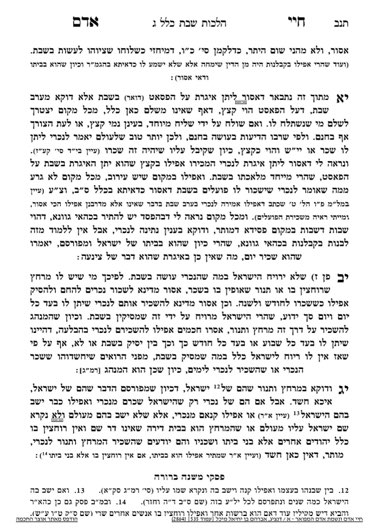We are continuing in siman 11, discussing mail on Shabbos. We have learned that a Jew cannot place a letter in the mail on Shabbos itself, but could place it in a public mailbox on Friday even if it will not be processed until Shabbos. The Jew cannot have the non-Jew take it from the Jew’s premises on Shabbos itself.
If a Jew gives mail to a non-Jew before Shabbos, but the arrangement is of a guaranteed delivery such that it will be delivered or processed on Shabbos itself, it is assur. This is known as meyacheid melachto, as we discussed previously in the fourth criteria of making amira l’achum muttar (S0073-0075).
The Chayei Adam will discuss a possible leniency through amira l’amira. We know that one of the leniencies in amira l’achum relates to shvus d’shvus (literally, a double derabanan), which is a general concept that if we have two layers of issurei derabanan, there are situations in which we may be lenient. Shvus d’shvus is permitted in conjunction with a loss of money out tzorech mitzvah.
The question which the Chayei Adam deals with is using Amira twice considered shvus d’shvus or just the same shvus twice. Over here, if amira l’achum is derabanan, and asking a second non-Jew to make the arrangements with the non-Jew who will work is derabanan, arguably we have two layers of derabanan, making amira l’amira a shvus d’shvus. Although one could argue that if so, any time one employs two derabanans (eg, asking a non-Jew to mail a letter), it should be muttar, the Chayei Adam paskens it is assur. However, even though he holds we cannot rely on amira l’amira in general, we can rely on amira l’amira but only when there is a significant loss.
Thus, if one has a letter which needs to be delivered as soon as possible, and there is a significant loss involved, one may perform amira l’amira to arrange for its delivery. The Mishnah Berurah paskens this way as well.
Taking this idea a step further, one could argue that if a Jew hires a non-Jew to hire and direct other non-Jewish workers to do work on a Jew’s property, it should be muttar as well. However, the Chayei Adam points out that since it is mechubar, it will still be assur.
Summary
- One cannot place outgoing mail in a mailbox on Shabbos itself, but can place it in a mailbox late Friday afternoon even if it will not be picked up until Shabbos itself (except if it is on a Jew’s premises, in which case it must be picked up before Shabbos.
- Mail with a guaranteed delivery date which will certainly be processed or delivered on Shabbos itself is assur; however, one may rely on amira l’amira regarding a letter in a case of significant loss (financial or otherwise).
- In General, amira l’amira is assur.



